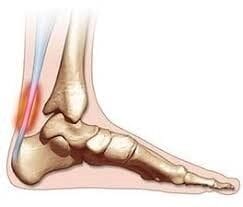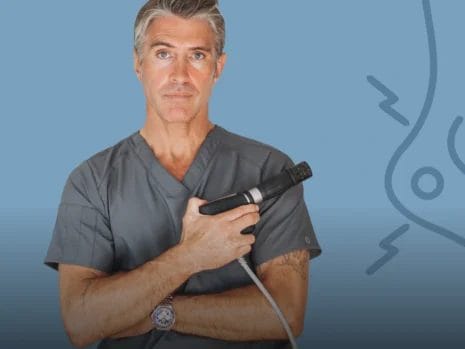Achilles Tendon Pain
CASE STUDY OF ACHILLES TENDON PAIN
A 37-year-old male in good health, attended the Sydney heel pain clinic complaining of Achilles tendon pain in his left foot. His problem had been ongoing for approximately six months and he reports to the sports podiatrist that over the last three weeks it got much worse. The Achilles tendon pain was limited to the left ankle only and did not affect his right side. The discomfort he felt ran along approximately 3 cm of the Achilles tendon shaft, just above the heel bone itself. This patient was a keen walker and enjoyed approximately 5 or 6 km walks with his dog each weekend. During the week, he would carry out shorter walks with his wife and his dog but would also experience the Achilles tendon pain regardless. He described a significant stiffness through the left ankle in general and found each morning when rising from bad to be problematic. As is often the case, following his morning routine including a hot shower, the Achilles tendon pain subsided significantly and he was able to continue with his day-to-day duties. He reports to the sports podiatrist that following long drives or extended periods of being seated, the Achilles tendon pain would return when he stood up or started walking. This gentleman explained to the podiatrist that he would occasionally use anti-inflammatory medication and this would reduce the symptoms. He had also decided carry out some home remedies including stretching and loading exercises, but he found that these increased symptoms. The Achilles tendon pain would subside slightly following the exercises but would return with increased intensity shortly afterwards.
ASSESSMENT OF ACHILLES TENDON PAIN
The sports podiatrist carried out a routine examination of the left ankle and noted severe Achilles tendon pain on palpation when finger pressure was applied. The patient was advised that he had a condition commonly known as Achilles tendinitis and that it may be complicated by a bursitis. The insertion of the Achilles tendon at the posterior aspect of the heel bone was unremarkable and did not induce pain or discomfort on palpation. The plantar fascia was also intact and nonproblematic. The patient was informed that the cause of his Achilles tendon pain was a classic Achilles tendinitis.
WHAT CAUSES ACHILLES TENDON PAIN?
Upon examination of this patients exercise shoes it became apparent that these were the cause of his Achilles tendon pain. The shoes were old and extremely worn and had softened considerably. His shoes were providing some form of comfort and a mild form of cushioning but lacked support and control. Due to the lack of support there was an excessive amount of pronation and hyper mobility of his left foot inside the shoe during gait. This would have increased the load on the Achilles tendon and caused significant stiffness through the lower calf.
TREATMENTS FOR ACHILLES TENDON PAIN
In order to reduce the Achilles tendon pain in this patient the sports podiatrist informed the patient that his footwear must be changed immediately. The patient was measured and fitted with a new pair of ASICs gel fortitude in the clinic and was observed on the treadmill. Video footage was recorded and replayed and the new shoes were approved. The sports podiatrist demonstrated and executed with the patient, standing calf stretches with the foot supinated. The patient was asked to apply ice to the posterior aspect of his ankle on a daily basis in order to reduce irritation and inflammation, and to minimise the Achilles tendon pain.

This patient returned for a follow-up at four weeks and reported to the sports podiatrist that his Achilles tendon pain had improved significantly. He advised the practitioner that there was some residual stiffness each morning when rising from bad but that the sharp stabbing sensations and the throbbing pain had gone completely. This patient had been compliant with the application of ice packs on a daily basis and had performed regular calf stretching, all of which helps to reduce the Achilles tendon pain.
If you are suffering with Achilles tendon pain or if you think you have Achilles tendinitis please do not take the information contained in this case study as medical advice.
You should consult with a suitably qualified healthcare practitioner. The sports podiatrists at the Sydney heel pain clinic have a special interest in Achilles tendon pain and appointments can be made on the following phone number: 02 9388 3322
Written by Karl Lockett



